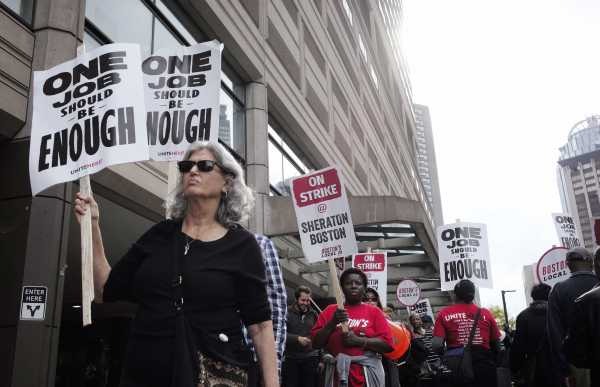
House Democrats are busy filling up their 2019 calendar.
After they take control of the House of Representatives in January, the new Democratic majority plans to compel President Donald Trump to release his tax returns, investigate his administration’s response to Hurricane Maria, and vote to protect people with preexisting conditions from losing their health insurance, among other items on the agenda.
When it comes to labor policy, House Democrats say the top priority is to raise wages and create more jobs. In February, House Minority Leader Nancy Pelosi released details of their official policy agenda, called A Better Deal, which focuses on strengthening labor unions, investing in apprenticeship programs, providing workers with paid leave and spending on infrastructure projects.
But House Democratic aides involved in labor policy discussions say there are two specific issues near the top of the list: raising the federal minimum wage from $7.25 to $15 an hour with the next few years, and expanding overtime pay to millions more workers.
That doesn’t mean Democrats will immediately get what they want, considering both measures would likely face stiff resistance from the GOP. But two House Democratic aides involved in the policy discussions told Vox that passing legislation to raise wages and expand overtime pay will put pressure on Senate Republicans and the White House to take a position on policies that have broad appeal among American workers, even in conservative states.
“This is not just a fairness issue. When workers earn a fair wage, it’s good for the economy,” one aide told Vox.
House Democrats also plan to use their oversight power to investigate some controversial moves by the Department of Labor, including efforts to allow employers to keep workers’ tips, and to permit teens to do more hazardous work in apprenticeship programs.
Here’s a brief overview of what House Democrats are reportedly pushing for, outside the official policy agenda.
Wages, wages, wages
Sluggish income growth remains one of the most persistent problems in the US economy, which is otherwise doing quite well. Unemployment is down, corporate profits have soared, and the economy is growing faster than it has in more than a decade. But wages are barely keeping up with inflation.
Wages rose about 2.9 percent between September 2017 to September 2018, according to the Labor Department. That’s the biggest increase since 2008, and yet that’s not really good news, because it doesn’t take inflation into account. In the past year, prices have been rising, so paychecks have to stretch further. When inflation is taken into account, workers’ wages only grew by 0.6 percent within the past year.
Frustration over stagnant wages is the underlying factor behind widespread workers’ strikes across the country. In addition, congressional Republicans had promised that their massive corporate tax cuts would help workers, and they haven’t.
Republicans insisted that companies would use much of those tax savings to give workers a raise. It’s been nearly a year since they passed the tax bill, and so far the windfall hasn’t materialized for the average American family. Instead, corporations have been using a lot of that money to buy back shares of their own company’s stock, which increases its value for shareholders.
Several House Democrats believe the solution is obvious: raise the federal minimum wage. It’s been stuck at $7.25 an hour for nearly a decade. Democratic aides told me that they want to push forward some version of the Raise the Wage Act, introduced in May 2017 by Rep. Bobby Scott (D-Va), the ranking Democrat on the House Committee on Education and the Workforce.
This law gradually raises the federal minimum wage to $15 an hour within seven years. After that, increases to the minimum wage would be tied to median wage growth for the overall workforce. The law would also phase out the lower minimum wage for restaurant servers and other tipped workers, which is currently $2.13 an hour. And employers would no longer be allowed to pay some disabled workers less than the minimum wage.
The bill has 170 co-sponsors, but none of them are Republicans, which is why the bill has not even left the workforce committee. But with House Democrats in the majority next year, they believe they will have enough votes to pass the law. Then they would pass it to the Senate, putting the current Republican majority in the position to reject it, negotiate a different version, or pass a similar version.
The White House has already suggested that it isn’t open to the idea. Trump’s top economic adviser, Larry Kudlow, recently said that he thinks the mere existence of a federal minimum wage is a “terrible idea,” because it hurts businesses.
Democrats know Republicans will likely push back on attempts to raise the wage floor, but they think passing a minimum-wage bill will put pressure on Republicans and the White House to do something. That’s because most Americans support the idea of raising the federal minimum wage, so it will not play well with voters if Republicans reject the bill.
House Democrats also say they have some questions about what the Labor Department has been up to — and plan to hold hearings on some controversial decisions the agency has made in the past two years.
Investigating the Trump administration’s controversial labor policy decisions
The US Department of Labor under Trump has done what many expected it to do: It has rolled back rules meant to protect and benefit workers. That includes delaying the Obama-era overtime rule, which would have granted overtime pay to 13.5 million more workers, and giving states more leeway to withhold unemployment benefits to laid-off workers if they don’t pass drug tests.
But House Democrats are particularly concerned about two changes proposed by the Department of Labor under Trump: a rule that would have allowed employers to keep workers’ tips, and a rule that would relax child labor laws.
The agency caused a furor in December 2017 when it announced plans to repeal the so-called “tipping rule.” The Obama-era rule made official what had been the common agency view for decades: that tips are the sole property of the workers who earn them. The Trump administration’s proposed change, however, would have essentially given control over workers’ tips to their bosses. Employers could decide to share workers’ tips with other staff, or keep tips for themselves, as long as they pay workers the full minimum wage.
To make matters worse, in February, Bloomberg Law reported that the Department of Labor had hidden an internal analysis from the public, which showed that the rule change would likely cost workers $600 million in lost tips each year.
Office of Management and Budget Director Mick Mulvaney and Labor Secretary Alexander Acosta overruled a group of government regulators who oversee the rule-making process, telling them to leave out the analysis before issuing the proposed rule for public notice and comment.
Rep. Bobby Scott (D-VA), the ranking Democrat on the House Committee on Education and the Workforce, said they plan to hold hearings to learn more about what went into that decision.
“If you’re having a regulatory change, the law requires you to produce the evidence to support the change,” Scott told Bloomberg Law last week.
Democrats later blocked most of the rule from going into effect in March, by adding a provision into the omnibus spending bill that would prevent employers from pocketing the tips.
House Democratic aides told me they also want to hold a hearing about a May proposal to scale back child labor protections to let 16- and 17-year-olds work longer hours in hazardous jobs.
The rule would have allowed teens to be trained for longer hours in dozens of jobs that the government has barred them from doing, including operating trash compactors, chainsaws, and meat slicers, according to Bloomberg Law, which obtained a summary of the draft regulation. This particular age group would still be barred from those jobs, but they would be allowed to do the hazardous work as part of certain apprenticeship programs.
News of the change sparked another uproar among labor advocates, who said it would lead to more teen deaths and injuries at work, though these types of incidents had generally been declining.
The agency’s proposal was later changed, and the current version would only relax some rules related to health care apprenticeships, which also involve operating heavy machinery.
The committee plans to ask the Department of Labor some questions about why the agency decided to change the rules. As part of its oversight authority over the labor department, House Democrats can request documents and compel staff to testify.
“We plan to make reasonable requests, so our expectation is that subpoenas will not be necessary,” an aide told me.
Sourse: vox.com






